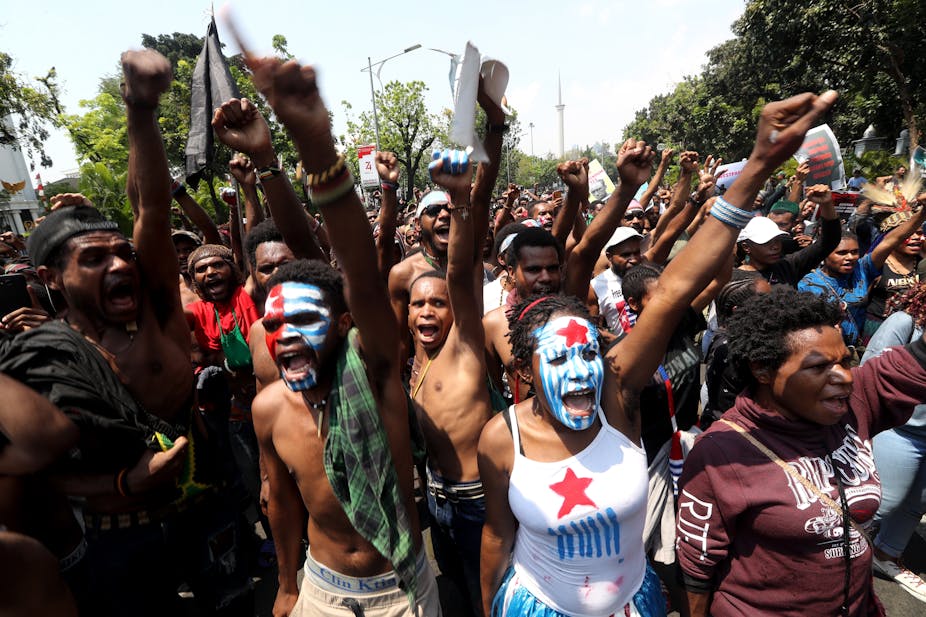The death of George Floyd on May 25 2020 adds to the long history of racist violence by police in the United States (US) and has reignited the protest movement Black Lives Matter (BLM).
In a pandemic, supporters of the movement returned to the streets to demand justice. They then received global support, ranging from South Africa, Australia and Britain to Japan.
In Indonesia, a debate has occurred over a comparison between Black Lives Matter and the issue of Papua, prompting the hashtag #PapuanLivesMatter on social media.
One of the discussions is about double standards in Indonesian society. People show high concern for racism in the US, but are silent about discrimination against indigenous Papuans.
On the surface, the two issues seem comparable because they are both about struggles against racism.
However, Indonesians need to understand what lies beneath these two movements and what the goal of each struggle is.
Differences
Slavery cannot be divorced from US history.
People of African descent have played a role in establishing the US as a nation-state since the 17th century, but white supremacy continues treating African Americans as second-class citizens.
Although slavery in the US was abolished in the 19th century, and civil rights was signed into law in the 1960s, discrimination continues.
Many black Americans today live below the poverty line. On average, white families have ten times the wealth of African American families. Most (40%) prisoners in the US are black people.
Police violence against African Americans is caused in part by a class structure and racial hierarchy.
The police are not the only ones with racial bias. But because they are authorised to use weapons and arrest people, officers’ racial bias can have fatal consequences.
This led to the emergence of the Black Lives Matter movement. Its target is racial bias, so that parties who have great authority such as the police do not easily make critical decisions that result in the loss of human lives.
Papuan people’s history is quite different from African Americans.
The most important issue in Papua is the demand for independence.
Only a few years after Indonesian independence, at a round table conference (Konferensi Meja Bundar) in 1949, the status of Papua was debated between Indonesia and the Netherlands.
The Netherlands wanted to turn Papua into a separate country under the kingdom. This was because indigenous Papuans have different ethnicities and races from the majority of Indonesian people.
This conflict over the status of Papua continues even though the Indonesian government held a referendum (Penentuan Pendapat Rakyat). In the referendum, 1,000 people were selected and asked to represent the entire Papuan population and they agreed to join Indonesia.
Unlike African Americans, Papuans have lived in the area that is now the Indonesian provinces of Papua and West Papua even before Indonesia’s independence.
This different historical background is also why the goals of the two movements are different.
Some Papuans demand independence from Indonesia because of Papua’s history and because Papua is one of the poorest regions in Indonesia despite its natural resources.
The Black Lives Matter anti-racism movement aims to eliminate systematic injustice against African Americans as part of US society.
Making use of momentum
The Papuan Lives Matter slogan has been widely discussed because of the ongoing violence against indigenous Papuans at the hands of authorities in the name of Indonesian sovereignty and security. This terrible violence is not much different from that experienced by African Americans.
In 2019, riots broke out in Wamena, Papua, which began with a siege and racist attack at a Papuan student dormitory in Surabaya, on Java Island.
It was only one of countless incidents of racist violence that have occurred for decades.
It has been increasingly important for indigenous Papuans that discussions on anti-racism cannot be separated from discussions about the struggle for independence.
When the Black Lives Matter issue arose, it wasn’t surprising that concerns about Papua were again raised.
Racist discrimination puts the indigenous people of Papua and African Americans under the socially and economically majority groups in their respective countries.
Both have experienced violence by other community members and by the government.
Using the momentum of the Black Lives Matter is important to increase Indonesian public awareness that racism is not only happening in the US but also in our own backyard.
Responding to both issues
Ongoing discrimination against African Americans and indigenous Papuans should encourage Indonesians to be more aware of the existence of systemic inequalities that are detrimental to certain groups.
Indonesians need to wake up to this, especially when we are not aware of the privileges we enjoy and have unknowingly allowed injustice to occur against a group of people.
The comparison of the two issues is also very relevant for pressing demands to the governments of both countries to uphold justice.
However, it must be realised that the two movements have different goals: a solution for one may not necessarily be a solution for the other.
Agradhira Nandi Wardhana translated this article from Indonesian to English.


